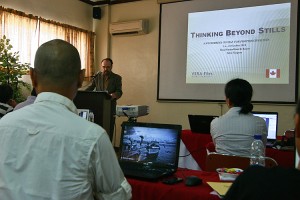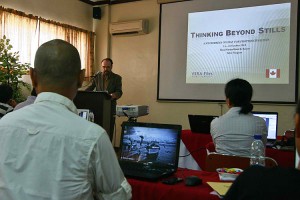 A CANADIAN diplomat said a Freedom of Information Law will make public servants more accountable and will be a tool against graft and corruption.
A CANADIAN diplomat said a Freedom of Information Law will make public servants more accountable and will be a tool against graft and corruption.
James Trottier, political and economic counselor of the Canadian Embassy in Manila, spoke about Canada’s experience with freedom of information at a photojournalism workshop organized by VERA Files at the Subic Freeport Zone last week.
Trottier said the law also built his government’s capacity to give citizens “timely and accurate information” on government services and transactions.
“The freedom of speech and expression and the right to information are closely intertwined with the principles that are promoted by democracy, the system of governance that Canada upholds and tries to promote in our work at home and in our diplomatic missions all over the world,” he said.
In contrast, the Philippines has been unsuccessful in getting a Freedom of Information law passed in Congress. An FOI bill was first filed in the eighth Congress, towards the end of former President Fidel Ramos’ term more than 12 years ago.
The bill was nearly enacted into law a few months ago before the 14th Congress adjourned, but the House of Representatives failed to approve it, citing a lack of quorum.
President Benigno Aquino III had promised during his campaign that he would work for the enactment of such a law. He has, so far, not made any moves to speed up its passage.
In a hearing last Thursday at the Senate, where 12 versions of the Freedom of Information bill were presented and discussed, Malacanang’s Press Communications Secretary Herminio Coloma listed palace reservations over the passage of the freedom of information bill.
The palace’s issues have to do with national security, personal privacy, trade secrets and impartial delivery of justice.
Coloma also said that a freedom of information law would mean additional work for government employees.
Citing Canada’s experience, however, Trottier said the freedom of information law “has made government workers and public servants thorough and transparent in all our dealings and activities, keeping in mind that what we spend are public funds, and thus we are ultimately accountable to the Canadian public.”
Trottier, a lawyer who has served in Canada’s Department of Foreign Affairs and International Trade for nearly 20 years, was the keynote speaker at the workshop entitled “Thinking Beyond Stills,” which gathered 10 photojournalists and three trainors to discuss ways of presenting news and information through multimedia platforms.
The Canadian Embassy made available a small grant for the workshop, which was organized and conducted by VERA Files.
